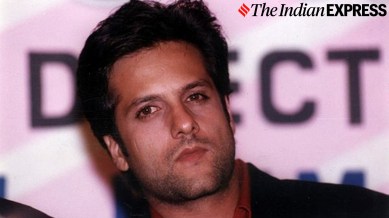📣 For more lifestyle news, click here to join our WhatsApp Channel and also follow us on Instagram
‘First time the brain fog lifted’: Fardeen Khan says he gave up alcohol in 2020 as it was ‘interfering’ with his life; how childhood trauma can lead to dependency
In an earlier conversation, Fardeen had also disclosed dealing with childhood dysfunction and early emotional trauma, stating, “I had to grow up very quickly, due to the dysfunction in which I grew up.”

Fardeen Khan, who made a powerful return to the screen with his recent appearances in Heeramandi and Housefull 5, has also been candid about a transformation that goes far deeper than his onscreen roles or physical appearance.
In a recent conversation with Cyrus Broacha, the actor revealed how his struggle with alcohol began at a young age — and how he finally chose to walk away from it during the COVID-19 pandemic. “I was at a stage where I just didn’t feel myself. I became sober in 2020, and I stopped drinking alcohol in one go. I needed to stop; it was interfering with my life. I took professional help to stop, and it was the best decision I have made. I started drinking very, very young, so this was the first time the brain fog lifted,” he said.
What brain fog is, and how alcohol contributes to it
Gurleen Baruah, existential psychotherapist at That Culture Thing, tells indianexpress.com, “Brain fog isn’t a clinical diagnosis, but many people describe it as feeling mentally dull, forgetful, or unable to focus—like the mind is moving through mist. Long-term alcohol use can contribute to this in several ways. Alcohol disrupts neurotransmitters, sleep cycles, and nutrient absorption, all of which are essential for cognitive function. Over time, this can lead to slowed thinking, poor memory, and emotional flatness.”
From a therapeutic lens, she says that chronic alcohol use can also serve as a numbing tool — keeping unresolved emotions buried. “This emotional avoidance, combined with the physiological impact on the brain, creates a state where clarity and emotional presence are difficult to access. It’s only when someone begins the process of sobriety and healing that the ‘fog’ gradually lifts, and a more grounded, connected version of the self can re-emerge.”
Using substances like alcohol to cope with childhood trauma
When emotional needs aren’t met in childhood, the nervous system adapts in survival mode. In such cases, substances like alcohol can become a way to self-soothe, escape, or numb what feels too overwhelming to face.
Baruah informs, “The body remembers what the mind can’t always articulate. So even years later, a person might reach for alcohol not because of the present moment, but because of the old emotional residue still living inside them. Healing begins when that pain is finally named, understood, and met with compassion rather than avoidance.”
Key elements of a successful recovery journey for someone with long-term alcohol dependency
Quitting alcohol “in one go” can sound impressive, Baruah states, but it’s not always safe or advisable for everyone — especially those with long-term or heavy dependency. “Sudden withdrawal can lead to serious health risks like seizures or delirium tremens. This is why professional supervision is so important — it helps monitor the body’s response and offers structured support through the most fragile stages of recovery,” stresses the expert.
Successful journeys often include medical care, therapy, peer support, and deep self-inquiry.
📣 For more lifestyle news, click here to join our WhatsApp Channel and also follow us on Instagram